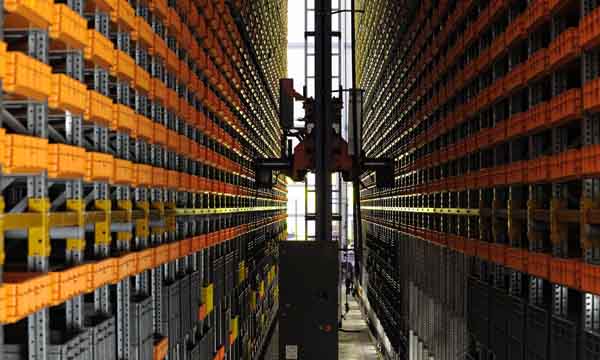Air France Industries counts on Lokad to manage its stocks |
| Léo Barnier |
|
|
02 NOV 2017 | 582 words
|
 |
© AFI KLM E&M |
|
|
|
For the last few months, Air France Industries KLM Engineering & Maintenance has been adopting a solution to optimise its inventory, in partnership with the small French company Lokad. This fully-online application provides fine part and component stock management from statistical analyses, determining the financial and operational consequences of each investment or disinvestment, thanks to the mass use of data and its processing by cloud computing. This innovation was presented by AFI KLM E&M at its stand at the Le Bourget airshow and at MRO Europe exhibition in London last month.
Simon Schalit, Lokad's Chief Operating Officer, describes their solution as a statistical tool which is slightly different from the usual: "We don't look at the most probable solution, we define how the others are improbable". The solution will then determine a probability for each scenario, taking account in particular of cases of very high or very low demand for certain parts which are the most expensive.
The return on investment is calculated for the purchase of each part, with a link made between the need covered and the cost. "I need to see the relationship between how much a part will get me and how much it will cost me", summarises Simon Schalit. Operational parameters, such as the essential nature of the parts and their impact on the ground immobilisation rate (AOG), their value, their availability or even the differences between repairable and replaceable consumable parts are included in the calculation model.
For Simon Schalit, their solution also enables them to move away from a silo approach. "We can see all the investments in relation to the others. We can calculate them in relation to changes in fleet, amount, constant or descending".
Rationalised stocks
Once these different elements have been integrated and analysed, the Lokad application will provide suggestions to help logistics managers to establish their purchasing or sales priorities across the whole inventory, taking the probable consequences of each decision into account. Simon Schalit is convinced that it is this suggestion capacity which actually generates added value.
Lokad has been able to use AFI KLM E&M's data for the last four years to establish these models. They may be strengthened further with the integration of processing time variability, which will make the statistical environment even more complex.
For Nicolas Kuhn, project manager at AFI, this provides gains in terms of anticipating actual requirements: "Before, we used to react in the heat of the moment. This solution helps us determine our investment and disinvestment requirements". Since autumn 2016, it has enabled the equivalent of 19 MEUR in excess stock at AFI KLM E&M. This figure could reach 27 MEUR by the end of the year.
Nicolas Kuhn can also see other advantages: "One of the most interesting modules is the optimisation of part distribution between the different stores". This takes account of the number of parts available, the potential need in the region, the procurement time and so on.
This partnership has been built in the context of the MRO Lab from 2015. Lokad was spotted during a joint operation with Spairliners, a subsidiary of AFI KLM E&M and Lufthansa Technik (LHT). The Franco-Dutch group then gave the company its chance with the introduction of a one-year case study, which was launched in autumn 2015. This proved the solution's worth and AFI KLM E&M integrated the Lokad solution. The two partners now want to market the solution to external customers. |
|
 |
Léo Barnier
Specialized journalist
Industry & Technology, Equipments, MRO
|
|
| |
They made this section possible |
|
|
|
|
|
|
|
|
|
|
|
|
|
|
|
|
Top stories |
|
|
|
|
|
Top stories
|